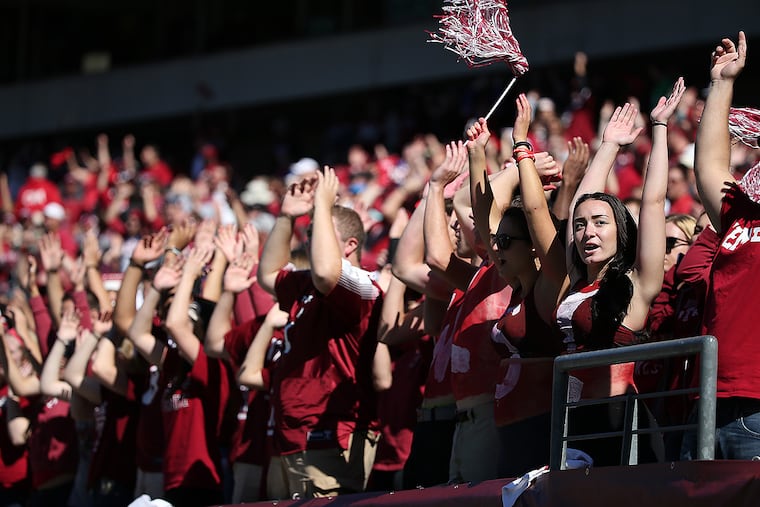At last Temple gets the spotlight
Leonard Barrack has been going to Temple football games since grade school in 1954 when his older sister first took him.

Leonard Barrack has been going to Temple football games since grade school in 1954 when his older sister first took him.
"I've been following Temple football for that long," said Barrack, a Philadelphia lawyer and member of Temple's board of trustees. "It's been a long drought."
How times have changed.
The Owls have posted an unexpected 7-0 record, the team's best start ever. Momentum is building for an on-campus stadium, with Temple president Neil D. Theobald and board of trustees chairman Patrick O'Connor both saying last week that they support the idea - and have secured three-quarters of the necessary funding.
And on Saturday - Halloween night - there will be the biggest game involving a local college team played here in decades. No. 22 Temple, ranked for the first time since 1979, hosts No. 11 Notre Dame at sold-out Lincoln Financial Field in a game that will be broadcast nationally on ABC.
No question, this is Temple's moment.
"There's never been a better time to be a Temple Owl," said student government president Ryan K. Rinaldi, 22, a senior finance major from the Scranton area.
Or a Temple fan.
"This is their time," Barrack hooted.
By no means are the gains just about football.
The university attracted a record 30,000-plus applicants this year and hurtled six spots in U.S. News and World Report rankings, its best showing yet. In the last three years, it has doubled its fund-raising to an unprecedented $84.2 million.
"Temple has momentum today not seen in decades," Theobald wrote to the university community last week.
A winning football team can pay off in ways not measured in the standings.
Universities with successful sports teams - especially when that success is unexpected - see boosts in fund-raising, applications, and reputation, according to a 2012 study by Michael L. Anderson, assistant professor of agriculture and resource economics at the University of California at Berkeley.
Another study by Douglas J. Chung, a Harvard Business School assistant professor, found that when a school dramatically increases its performance on the football field, applications rise 19 percent. More applications translate to higher selectivity. And success, Chung found, even draws students with high SAT scores.
The positive influence has a name: "the Flutie Effect."
After Doug Flutie's last-second "Hail Mary" pass won a game for Boston College in 1984, the school enjoyed a surge in popularity. Over the next two years, applications increased about 30 percent, though some remain skeptical of the gridiron connection.
Theobald said he has always believed in the power of sports to raise a university's profile, especially when televised nationally. Two million watched Temple beat Penn State earlier this season, he said.
"It's the front door to the university," he said. "We could have a wonderful philosophy conference and it wouldn't garner that kind of attention. American society is interested in collegiate sports, and if you do it well, people take pride in what's happening and they get engaged."
Jane Scacceti, a member of the board of trustees, said she believes the research that victories in sports resound across campus.
"It's important to kids," she said. "They want to be part of a university that has that cultural piece to it. I think it does impact the quality of our students and the quality of professors who want to come and teach here."
Dan Polett, also a trustee, said he hasn't been this excited about football since high school. He loves that Temple coach Matt Rhule has promised not to shave as long as his team keeps winning.
"He had no idea it would go on this long," Polett said. "He said the beard was driving him a little crazy but he hopes it grows down to his knees."
Whether the football cheers ultimately will build enough support for a stadium remains uncertain.
"This clearly is the political time to put a message out there for a stadium," said Andrew Glose, 28, a computer science major. "I'm a football fan so that would be amazing."
Hazim Hardeman, a junior in strategic communications, said he supports a stadium, as long as it doesn't impact tuition.
"I think it would add to the environment as far as Temple creating its own brand," Hardeman said.
Others aren't so sold.
"It's a waste of money," said Laura Schaefer, 18, a freshman from Media.
But if the Owls find a way to beat the Fighting Irish next Saturday, the payoff to the university could prove invaluable.
215-854-4693@ssnyderinq
INSIDE
StartText
Questions for Owls on stadium.
Mike Jensen, D6.
EndText